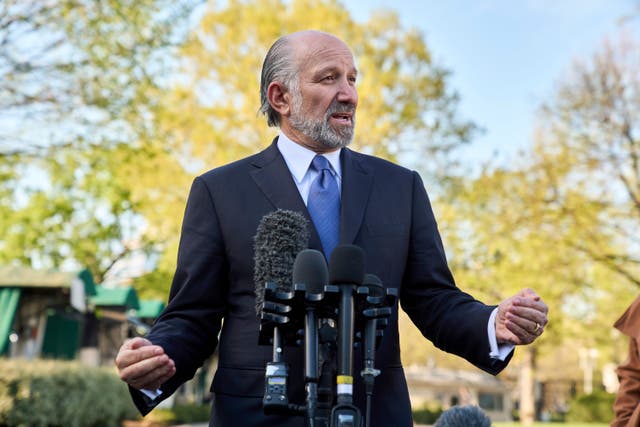Trump’s commerce secretary says electronics tariff exemptions are temporary
Howard Lutnick said semiconductor tariffs ‘are coming in probably a month or two’.

Tariff exemptions on electronics like smartphones and laptops are only a temporary reprieve until the Trump administration develops a new approach specific to the semiconductor industry, an official has said.
White House officials, including President Donald Trump himself, spent Sunday downplaying the significance of exemptions that lessen but will not eliminate the effect of US tariffs on imports of popular consumer devices and their key components.
“They’re exempt from the reciprocal tariffs but they’re included in the semiconductor tariffs, which are coming in probably a month or two,” commerce secretary Howard Lutnick told ABC on Sunday.
Mr Trump added to the confusion hours later, saying on social media that there was no “exception” because the goods are “just moving to a different” bucket and will still face a 20% tariff as part of his administration’s move to punish China for its role in fentanyl trafficking.

The Trump administration had said late on Friday that it would exclude electronics from broader so-called reciprocal tariffs, a move that could help keep the prices down for phones and other consumer products that are not usually made in the US.
China’s commerce ministry in a Sunday statement welcomed the change as a small step even as it called for the US to cancel the rest of its tariffs.
Sparing electronics was expected to benefit big tech companies like Apple and Samsung and chip makers like Nvidia, though the uncertainty of future tariffs may rein in an anticipated tech stock rally on Monday.
US Customs and Border Protection said items like smartphones, laptops, hard drives, flat-panel monitors and some chips would qualify for the exemption. Machines used to make semiconductors are excluded too, which means they will not be subject to most of the tariffs levied on China or the 10% baseline tariffs elsewhere.
It was the latest tariff change by the Trump administration, which has made several U-turns in its massive plan to put tariffs in place on goods from most countries. White House officials sought to dismiss any suggestion of a reprieve as the weekend progressed.
“It’s not really an exception. That’s not even the right word for it,” trade representative Jamieson Greer told CBS on Sunday. “This type of supply chain moved from the tariff regime for the global tariff, the reciprocal tariff, and it moved to the national security tariff regime.”
He added that “the president decided that we’re not going to have exemptions. We can’t have a Swiss cheese solution to this universal problem that we’re facing”.
Mr Trump told reporters on Saturday night that he would get into more specifics on exemptions on Monday. In a social media post on Sunday, he promised the White House was “taking a look at Semiconductors and the WHOLE ELECTRONICS SUPPLY CHAIN”.
Some had assumed the exemption filed on Friday night reflected the president’s realisation that his China tariffs are unlikely to shift more manufacturing of smartphones, computers and other gadgets to the US any time soon, if ever.
The administration has predicted that the trade war will prod Apple to make iPhones in the US for the first time, but that is an unlikely scenario after the tech giant spent decades building up a finely calibrated supply chain in China.
It would take several years and cost billions of dollars to build new plants in the US, burdening Apple with economic forces that could triple the price of an iPhone.
The turmoil has battered the stocks of tech’s “Magnificent Seven”: Apple, Microsoft, Nvidia, Amazon, Tesla, Google parent Alphabet and Facebook parent Meta.
At one point, their combined market value had plunged by 2.1 trillion dollars, or 14%, from April 2 when Mr Trump unveiled sweeping tariffs on a wide range of countries. When he paused the tariffs apart from on China on Wednesday, the lost value in those companies was pared to 644 billion dollars, or a 4% decline.





